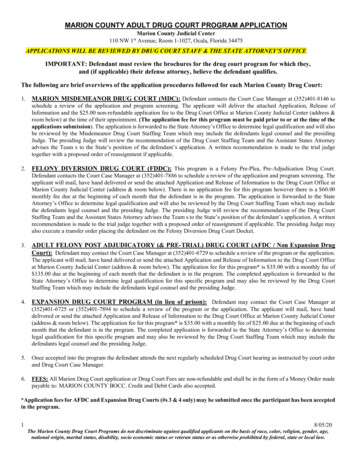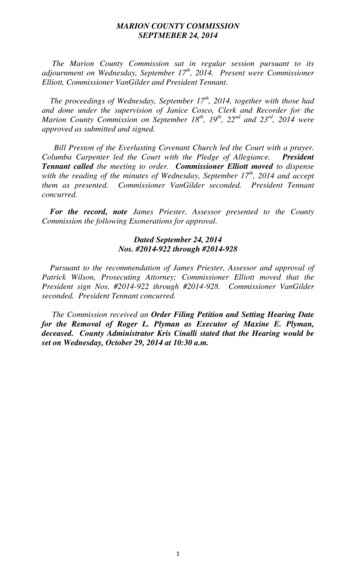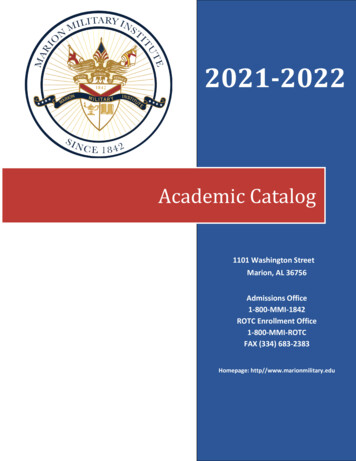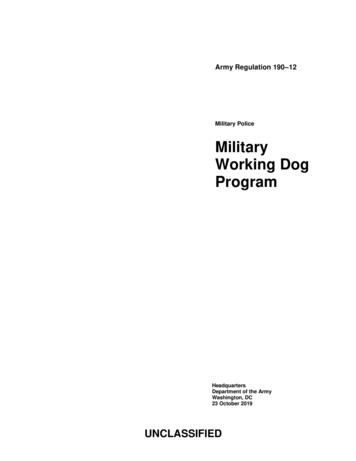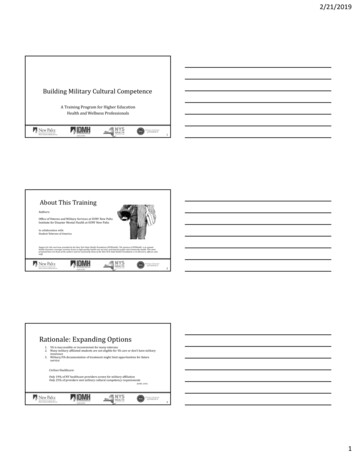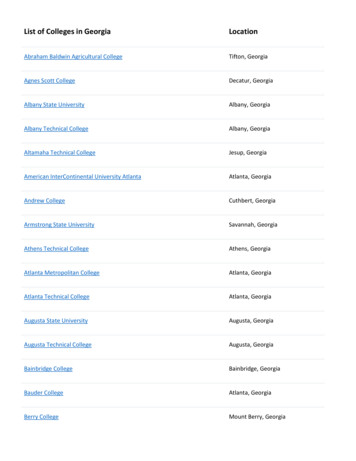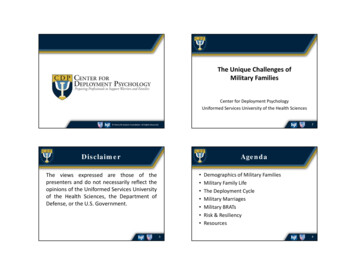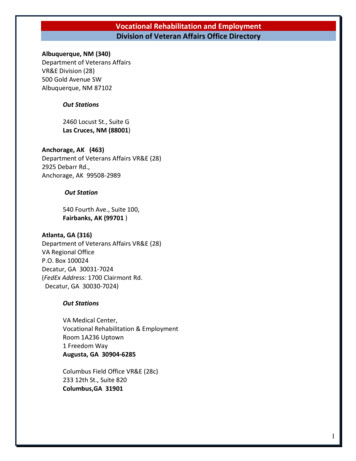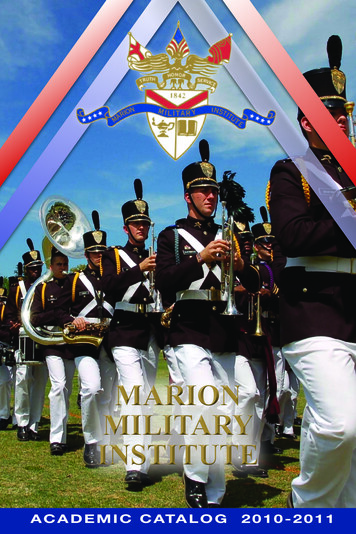
Transcription
MARIONMILITARYINSTITUTEA C A D E M I C C ATA L O G2010-2011
marion military institute1101 WASHINGTON STREETMARION, AL 36756ADMISSIONS OFFICE 1-800-MMI-1842ROTC ENROLLMENT OFFICE 1-800-MMI-ROTCFAX (334) 683-2383Homepage: http//www.marionmilitary.eduAcademic Catalog2010-2011The provisions of this catalog are subject to modification,revocation, and/or additions as deemed necessary by theadministration and faculty.
TABLE OF CONTENTSA Message From the President.3A Message From the Vice President for Academics.4About Marion Military Institute.5Programs.8General Academic Policies.10Cadet Activities and Services.22Admissions Information.28Academic Programs.34Course Descriptions.37Costs Financial Aid, and Scholarship Programs.54Administration and Faculty.71Foundation Board.79
David J. Mollahan, USMC (Ret)PresidentMarion Military InstituteColonel David J. Mollahan, U.S. Marine Corps(retired) became the 16th President of Marion MilitaryInstitute on 1 August 2009. He had been serving at theU.S. Naval Academy as Division Director, Humanitiesand Social Sciences Division, and as the senior MarineCorps Representative until 1 July 2009 when he retired,completing a 30-year Marine Corps career.He was commissioned in June 1979 upon graduation from Oregon State University,where he earned a Bachelor of Science degree in Nuclear Engineering Technology.He later earned a Master of Military Studies degree from Marine Corps Commandand Staff College where he graduated as a Distinguished Graduate. ColonelMollahan also attended the Marine Corps Amphibious Warfare School, the JointForces Staff College, and the Massachusetts Institute of Technology (MIT) SecurityStudies Program as the Commandant of the Marine Corps Fellow.Colonel Mollahan’s military career has included multiple land and sea-baseddeployments to Okinawa, Korea, the Mediterranean Sea, the Indian Ocean and thePersian Gulf. He has participated in contingency and combat operations in Liberia,Somalia, the Adriatic Sea, Kosovo, and Iraq. His assignments have includedCommanding Officer, Marine Medium Helicopter Squadron 263 (reinforced); DeputyChief of Staff, U.S. Joint Forces Command; Chief of Staff, 2d Marine Aircraft Wing;and Commanding Officer, Marine Aircraft Group 26 (reinforced).His personal decorations include the Defense Superior Service Medal, Legion ofMerit with Gold Star, Bronze Star Medal, Meritorious Service Medal, Air Medalwith Bronze Numeral 4, Navy Commendation Medal, Combat Action Ribbon, (8)Sea Service Deployment Ribbons, the Humanitarian Service Medal, and variousother unit awards and decorations. He has also accumulated over 4100 mishap freeflight hours as a Marine naval aviator, including over 250 combat flight hours.Colonel Mollahan and his wife Ingrid have two sons; LT Sean Mollahan, USN,U.S. Naval Academy ’02, a P-3 Orion Naval Flight Officer; and 1stLt KellenMollahan, USMC, U.S. Naval Academy ’05, a MV-22 Osprey aviator.3
A Message from the Vice President for AcademicsDear Prospective Students,We are happy that you are consideringattending Marion Military Institute to receiveyour associate’s degree. Our Institute,established in 1842, has a strong heritage andreputation for preparing young men and womenfor further study at senior institutions and thensubsequently, for fulfilling careers. Likewise, wework to instill in our students a strong sense ofself-discipline and responsible citizenship.We offer an associate in science program,which prepares our students for transfer to a fourSusan G. StevensonAcademic Dean & Vice Presidentyear college or university of their choice. Weoffer a strong curriculum taught by credentialedfaculty who care about our students and their educational progress. At MarionMilitary Institute, we pride ourselves on knowing each of our students byname and working to ensure that our students have a positive and beneficialeducational experience. Our small class size and caring environment have apositive and lasting impact on our students.We hope that you enroll with us and experience our excellent educationalofferings and student-oriented environment.Sincerely,Susan G. StevensonAcademic Dean & Vice President
ABOUT MARIONMILITARY INSTITUTELOCATIONMarion Military Institute is located in Marion, Alabama. Marion is a smalltown located in the west-central section of Alabama, an equal distance fromBirmingham and Montgomery. The institute is located about an hour’s drivesouth of Tuscaloosa.5
CAMPUSThe campus encompasses 148 acres including a lighted athletic field, baseballdiamond, softball field, nine-hole golf course, and six tennis courts in addition toacademic buildings, dormitories, and a cafeteria. A multi-purpose athletic centerhouses a large stage for drama and other performances, a twenty-five meter indoorswimming pool, a racquetball courts, a weight room, a wrestling center, and acollegiate basketball court. The centerpiece of the campus is its historic chapelfeaturing six historic, stained glass windows.The college student lounge is located adjacent to the golf course and featureswide-screen televisions and a snack area. A golf pro shop is located on the first floorof the student lounge. In the center of campus, the students also have access to asnack bar, barber shop, mail room, uniform shop, and Bookstore.HISTORYMarion Military Institute is one of fivemilitary junior colleges in the United States.The Institute traces its origin back to 1842when Howard College was founded in Marion,Alabama. In 1887, the Baptist State Conventionmoved the college to Birmingham. Thepresident of Howard College, Colonel James T.Murphy, remained behind to become the founder of Marion Military Institute. Theproperty was transferred to a self-perpetuating Board of Trustees, and a charter fora nonprofit educational institution was granted by the State of Alabama. In 2006,Marion Military Institute became a member of the Alabama two-year college system,and hence, became state-supported.Since 1887, MMI has been a military school. At the turn of the century, considerableeffort was devoted to patterning the school after prominent English schools. In fact,literature of the period details the effort to make Marion the “Eton of the South.” Thefirst World War interrupted this plan, and Marion developed as a military high schooland junior college. Although Army Junior and Senior ROTC has been an integralpart of the Institute, emphasis on academics remains the essence of the school. AtMarion Military Institute, learning takes place in an ordered atmosphere, in whichdiscipline is the core and foundation.Preparation for the nation’s service academies has been a specialized part of theMarion Military Institute program since 1910. The General Bruce K. HollowayService Academy Program utilizes MMI’s sound academic curriculum andoutstanding ROTC program to provide extraordinary preparation for students seekingappointments to the service academies. The fact that more than 200 generals andadmirals began their military education here ably attests to the effectiveness of theprogram.6
VisionMarion Military Institute willcontinue to transform itself throughinitiatives which will create comprehensive excellence, innovative leadership, and strategic alliances. MMIwill broaden the range of rigorousand relevant academic programs; recruit quality cadets, faculty, and staff;increase enrollment; and expand itscommitment to superior infrastructure, including modern technology.This transformative process will enhance MMI’s nationally recognizedposition as a unique, premier twoyear college preeminent in military training and dedicated to the success of all cadets.MissionMarion Military Institute, a twoyear public institution, educates andtrains the Corps of Cadets in orderthat each graduate is prepared forsuccess at four-year institutions, including the service academies, withemphasis on providing intellectual,moral-ethical,physical-athletic,and leadership development experiences in a military environment.7
AccreditationMarion Military Institute (MMI) is accredited by the Commission on Colleges ofthe Southern Association of Colleges and Schools to award associate degrees. TheCommission on Colleges of the Southern Association of Colleges and Schools is therecognized regional accrediting body in the eleven U.S. Southern States (Alabama,Florida, Georgia, Kentucky, Louisiana, Mississippi, North Carolina, South Carolina,Tennessee, Texas and Virginia) and in Latin America for those institutions of highereducation that award associate, baccalaureate, master’s or doctoral degrees.Documents describing the MMI’s accreditation can be reviewed upon request at theOffice of Institutional Research located in the Administration Building on WilkersonDrive. Direct inquiries to the Southern Association of Colleges and Schools (SACS)concerning Marion Military Institute’s accreditation should be forwarded to:Southern Association of Colleges and Schools1866 Southern LaneDecatur, Georgia 30033-4097Telephone number: 404-679-4501http://www.sacs.org/ProgramsAll cadets are required to enroll in either basic or senior ROTC. Credit for priormilitary training at accredited institutions or military service may be granted by theAcademic Dean and the Professor of Military Science.8
Early Commissioning Program (ECP)The Early Commissioning Program provides the opportunity for cadets to receivea commission as an Army officer two years earlier than their peers at four-yearcolleges or universities. To be eligible for this unique, accelerated program, a cadetmust qualify for the program and commit to a basic term of service in the U.S. Armyin either an active duty or reserve forces duty status. Cadets qualify for the ECP inone of the following ways: completion of the Army ROTC Leaders’ Training Coursein the summer prior to admission; prior military service with at least completionof the basic training component or the equivalent; or at least 3 years of JROTCand approval of the Professor of Military Science. An advanced ROTC cadet mustsuccessfully pass a standard army physical (medical examination) and have noprevious record of arrests or convictions.Upon successful completion of the Advanced ROTC courses and the EarlyCommissioning Program, the cadet will be commissioned as a second lieutenant inthe Army. Upon achieving a baccalaureate degree, a second lieutenant may competefor continuous active duty or enter active duty for training and remain with theNational Guard or Army Reserve.The General Bruce K. HollowayService Academy Program (SAP)Each year, young men and women attend Marion Military Institute to preparefor admission to the service academies. The General Bruce K. Holloway ServiceAcademy Program, established in 1907 and the oldest such program in the UnitedStates, offers a year of solid academic preparation, military training, leadership, andphysical development.All cadets enrolled in the Service Academy Program are assigned to regularacademic classes. Additionally, special courses in mathematics, English, vocabularydevelopment, and testing orientation are offered. Special attention is also given tophysical conditioning.All SAP candidates must be morally, physically, medically, and academicallysound. All candidates must, as a minimum, meet all ROTC standards. It is verydesirable that candidates show participation in high school sports, other high schoolactivities, and indicate their willingness and ability to participate in the overall MMIprogram. The only exceptions to these criteria may be those candidates sponsoredby a specific service academy. The College has established additional admissionrequirements for these specific programs.1. For admission to the Early Commissioning Program, the applicant must havea minimum of a 19 composite on the ACT (equivalent on the SAT) and aminimum high school grade point average of 2.00.2. For admission to the Basic Cadet Program, the applicant must have a minimumof a 16 composite on the ACT (equivalent on the SAT) and a strong highschool record of academic achievement in core courses.3. For admission to the sponsored Service Academy Preparatory Program, thesponsored applicant must have a score on the SAT of 1100 or more (ACT compositeof 24 or more) with both a math and verbal score of 540 or more, and at least a2.5 high school grade point average. The only exceptions to these criteria may bethose made by the sponsoring Academy or those candidates deemed eligible for theprogram by the Director of the Service Academy Preparatory Program.9
Air Force ROTC (AFROTC)MMI cadets may pursue a commission as an Air Force officer through the AirForce ROTC program. Cadets can complete two years at MMI before transferring toa senior college or university to complete the commissioning program for the UnitedStates Air Force.Marine Corps Platoon Leaders Course (PLC)The Platoon Leaders Course (PLC) is a program designed to provide collegefreshmen, sophomores, and juniors with the opportunity to earn a Marine officer’scommission. Upon completion of summer training, applicants may begin receivinga monthly stipend. Upon completion of a bachelor’s degree at a four-year university,applicants are commissioned as Second Lieutenants in the United States MarineCorps.Basic CadetThe Basic Cadet Program at MMI is designed specifically for those students whowish to enroll at MMI without incurring a military service obligation. Basic cadetsrealize a military environment offers them something extra. This added bonus isan opportunity to live a disciplined lifestyle while gaining practical experience inleadership and organizational management. Cadets learn within the framework ofa military academy environment while preparing for civilian careers. Basic cadetsenroll in military science I and II.10
GENERAL ACADEMICPOLICIESClassification of StudentsA cadet enrolled for 12 or more semesterhours of credit is classified as full-time.In order to make satisfactory progresstoward the associate’s degree, however, itis recommended that cadets carry at least15 to 16 hours of credit each semester. Anycadet who wishes to take more than 19 hoursof credit must receive approval to registerfrom both his/her academic advisor and theAcademic Dean.Placement TestingMarion Military Institute assesses each incoming college cadet in English,mathematics, and reading. The purposes of the assessment are to determine readinessfor college-level courses and to establish initial placement in appropriate collegelevel or college-preparatory courses. Cadets who test below college-level readinessin English, mathematics, and/or reading will be required to take developmentalcourses prior to enrolling in the college-level core curriculum courses.Registration for Courses andChanges in the Cadet ScheduleCurrently enrolled cadets have the opportunity to register first. They may expectto register just prior to the end of the preceding semester. Cadets may make changesin their class schedule by adding and/or dropping classes through the first five daysof each semester. The dropped classes are not recorded on the cadet’s transcript.After the first week of class and through the date specified in the academiccalendar, a cadet may withdraw from individual courses. While enrolled, however,a cadet must at all times maintain a full class load which is defined as twelve credithours. Audited courses and courses from which a student withdraws are subject tothe same fees as regular courses. Cadets may withdraw from the entire semesterthrough the last day of class, as published in the academic calendar. At the point ofwithdrawal the cadet will receive a grade of W for the course(s).11
Repeating A CourseWith certain exceptions, a cadet mayrepeat any course(s) in which he/shewas previously enrolled. Each attemptthat results in an official grade (A, B, C,D, F, W) will be recorded on the cadet’stranscript, and each attempt resultingin an official grade will be used in thecalculation of the grade point average.When the cadet applies for graduation,however, only the last grade awardedwill be included in the calculation of the grade point average for graduation purposes.No course in which the last grade received was an “F”, “W”, or “I” may be countedtoward graduation.Class AttendanceCadets are expected to attend every class meeting. Attendance is considered acontract with obligated appointments and specific expectations of attendance. Inthe event that a cadet must miss class due to a school-sponsored activity, the cadetis advised to meet with the instructor prior to the absence to arrange completion ofmissed work.Nonattendance does not constitute a withdrawal from class or from the college.Marion Military Institute has procedures in place that must be followed in the eventthat a student must leave the college during the semester. Ceasing to attend and notfollowing these procedures will result in a grade of “F” for the cadet’s courses.Grading SystemA grade is awarded in each credit course. The grade is based on the student’sdemonstrated proficiency as determined by the faculty member teaching the course.The following grading system is used at Marion Military ePoorFailureQuality Points43210Other markings which may appear on the grade report or transcript are asfollows.I – Incomplete. A mark used only for students who cannot completecoursework because of extreme hardship. The incomplete must be made up12
no later than the end of the following semester or the incomplete turns intothe grade of F.The incomplete grade indicates that a student was passing a course at the end of thesemester but was unable to complete the course due to extenuating circumstances.The assignment of the “I” grade may be awarded after consultation between thestudent and the instructor. If it is determined that an incomplete should be assigned,the instructor will complete the “I” Grade Assignment Form and both the instructorand the student will sign the form. The form will then be forwarded to the appropriateDepartment Chair for approval. Information on the form will include a descriptionof the work to be completed and the date for completion. The date for completionmay not exceed the published last day class for the following semester, excludingsummer. Failure to complete the “I” grade agreement within the specified timeperiod will result in the assignment of a grade of “F” for the course. A course with agrade of “I” will not count as enrolled hours in a subsequent term.AU – Audit. Course taken for no credit. Credit hours will not be averagedinto the grade point average. Must be declared by the end of the registrationperiod and may not be changed thereafter.W – Official withdrawal from a course within the designated time periodor withdrawal from the institution within a time period designated by theinstitution. Credit hours will not be averaged into the grade point average.President’s and Dean’s ListsAt the end of each semester, cadets who are enrolled in at least twelve credit hoursof college-level coursework and who earn a 4.0 grade point average are named tothe President’s List. Cadets enrolled in at least twelve credit hours of college-levelcoursework who earn between a 3.5 and 3.99 grade point average are named to theDean’s List.Final Grade Appeal ProcedureWhen a cadet believes there are circumstances that warrant the appeal of the finalgrade received in a course, the student may appeal the grade. The appeal processmust begin within 15 calendar days of the beginning of the subsequent semester.Grounds for Appeal Errors of omission. The cadet contends that a certain test, homework, orclass project was submitted at the designated time but not graded.Errors in averaging. The cadet contends that an error occurred in themathematical calculations of graded material.Errors in course practices. The cadet contends that there was significantdisparity between the course syllabus and the manner in which the coursewas conducted.13
Procedures for Appeal1. The cadet must consult with the instructor of the class to ensure that nocalculation or administrative error has occurred.2. If no satisfactory agreement is reached with the instructor, the cadet maysubmit a written appeal to the appropriate Department Chairperson. TheChairperson will investigate the appeal, render a decision, and submita written report of the findings to the student, instructor, and the VicePresident of Academics.3. If the appeal is denied by the Department Chairperson, the cadet mayforward the written appeal to the Academic Dean. The Dean will reviewthe appeal, render a decision, and submit a written report of the findingsto the cadet.4. If the cadet is not in agreement with the decision of the Dean, he or shemay request a hearing before an Appeals Committee. The committeemembers will review the appeal to insure that it meets one of the threeallowable grounds for appeal and explains clearly how it meets thegrounds for appeal. If the committee determines that the appeal hasmerit for further investigation, a hearing will be scheduled.5. The Appeals Committee will forward a recommendation to the AcademicDean, who will review the subcommittee’s recommendation.6. The Academic Dean will issue a written opinion relative to thesubcommittee’s report and forward the opinion to the President.7. The President’s decision will be final.Academic Standards of ProgressA cadet who fails during any term to attain a cumulative grade point averageat or above the level indicated below for the hours attempted (inclusive of anydevelopmental courses) will be placed on academic probation for the subsequentterm.Hours Attempted12-2122-3233 or moreMinimum GPA1.501.752.00Intervention for Student SuccessWhen a cadet does not meet the required retention standard, institution officialsmay provide intervention for the cadet by taking steps including but not limitedto, imposing maximum course loads, requiring regular meetings with the academicadvisor, and/or prescribing other specific courses.14
Application of Standards of Progress1. When the Cumulative GPA is at or above theGPA required for the total number of credit hoursattempted at the institution, the student’s status isCLEAR.2. When a cadet’s Cumulative GPA is below the GPArequired for the number of credit hours attemptedat the institution, the cadet is placed on AcademicProbation.3. When the Cumulative GPA of a cadet who is onAcademic Probation remains below the GPA requiredfor the total number of credit hours attempted at theinstitution but the semester GPA is 2.0 or above, the cadet remains on AcademicProbation.4. When the Cumulative GPA of a cadet who is on Academic Probation remainsbelow the GPA required for the total number of credit hours attempted at theinstitution and the semester GPA is below 2.0, the cadet is suspended for onesemester. The transcript will read SUSPENDED – ONE SEMESTER.5. The cadet who is suspended for one semester may appeal. If, after appeal, thecadet is readmitted without serving the one semester suspension, the transcriptwill read SUSPENDED – ONE SEMESTER / READMITTED UPON APPEAL.The cadet who is readmitted upon appeal re-enters the institution on AcademicProbation.6. A cadet who is on Academic Probation after being suspended for one semester(whether the cadet has served the suspension or has been readmitted upon appeal)without having since achieved Clear academic status and whose Cumulative GPAfalls below the level required for the total number attempted at the institution butwhose semester GPA is 2.0 or above will remain on Academic Probation untilthe cadet achieves the required GPA for the total number of hours attempted.7. A cadet returning from a one-term or one-year suspension and, while on academicprobation, fails to obtain the required GPA for the number of hours attemptedand fails to maintain a term GPA of 2.0, will be placed on a one-year suspension.8. The cadet may appeal a one-term or one-year suspension.9. The permanent cadet record will reflect the cadet’s status (except whenthe status is clear). When appropriate, the record will reflect ACADEMICPROBATION, ACADEMIC SUSPENSION - ONE TERM, ACADEMICSUSPENSION – ONE YEAR, ACADEMIC PROBATION – ONE YEAR,ONE TERM SUSPENSION – READMITTED ON APPEAL, OR ONE YEARSUSPENSION – READMITTED ON APPEAL.15
Academic ProbationCadets placed on academic probation must meet the following criteria at the endof their next term of enrollment. Attain a cumulative grade point average meeting the minimum retentionstandards, or Attain a 2.0 grade point average for that term.For a cadet who is on academic probation, failure to meet one of the abovereferenced criteria will result in academic suspension of the cadet for one term.The summer term does not count as a semester of suspension. A cadet whosecumulative grade point average remains below the minimum retention standard butwhose term grade point average continues to be 2.0 or higher will be permitted tocontinue enrollment but will remain on academic probation. When a cadet is placedon academic probation or readmitted after suspension, college officials may provideacademic intervention for the cadet by imposing maximum course loads, requiringregular meetings with the academic advisor, or imposing other appropriate measuresto assist the cadet in returning to proper academic standing.Process for Appeal of SuspensionA cadet who has been academically dismissed from Marion Military Institutemay request an appeal through the MMI Appeals Committee. If the cadet contendsthere were extenuating circumstances (e.g., documented medical or psychologicalproblems, court or military duty, etc.) that contributed to the academic dismissal, anappeal for reinstatement may be considered by the committee.The appeal must be filed with the Vice President for Academics. If the AppealsCommittee grants the reinstatement, the conditions imposed by the committee willbe clearly stated. The conditions may include a reduced course load and regularmeetings with an academic advisor.Student Educational RecordsMarion Military Institute maintains an official academic record in the Office ofthe Registrar for each cadet. This permanent academic record includes all completedcoursework, grades, and grade point averages. Access to academic records isprovided in accordance with the Family Educational Rights and Privacy Act asamended in 1974. Procedures for cadet access and other access to the academicrecord are published annually in the Cadet Handbook. The Institute reserves theright not to release a transcript if the cadet has outstanding financial obligations tothe College.The Institute may release “Directory Information” as defined by Marion MilitaryInstitute under the authority of the Act, unless the cadet informs the Office of16
the Registrar that such information should not be released without the cadet’s priorconsent. Directory information, as defined by MMI, includes a cadet’s name,addresses (campus, home, mailing, email) and telephone numbers, class level,previous institutions attended, awards, honors (including Dean’s List and President’sList), degrees conferred (including dates), dates of attendance, names of parents, pastand present participation in officially recognized sports and activities, physical factors(e.g., height and weight of athletes), and date and place of birth. A request to withholdDirectory Information must be filed with the MMI Office of the Registrar by the thirdweek of the first semester that such information is not to be released.Graduation and Degree RequirementsMarion Military Institute awards the associate in arts (AA) and the associate in science(AS) degrees. To be eligible to receive a degree from Marion Military Institute, cadets mustadhere to the following requirements. Complete a minimum of 64 college-level semester credits required for the associatedegree.Earn at least a 2.0 cumulative grade point average.Fulfill all courses required for the degree as outlined in the Marion Military InstituteCollege Catalog. Cadets are required to be in residence for their sophomore year andto participate in commencement exercises to receive their diploma.Complete and file an Application for Graduation prior to the end of the fall semesterjust before the anticipated final semester.Resolve all MMI obligations, financial or otherwise, and return all library and collegematerials.Complete at least 25 percent of semester credit hours at Marion Military Institute.Other guidelines pertaining to graduation are as follows. Cadets will be permitted to graduate by meeting the requirements of the catalog underwhich they entered, providing graduation is within four years of initial enrollment.After the four year period, cadets may be required to meet the requirements stated inthe current catalog.Cadets must complete an assessment battery as required to measure general educationachievement in various areas for the purpose of evaluation of academic programs.No minimum score or level of achievement on the battery is required for purposes ofobtaining a degree
marion military institute 1101 WASHINGTON STREET MARION, AL 36756 ADMISSIONS OFFICE 1-800-MMI-1842 ROTC ENROLLMENT OFFICE 1-800-MMI-ROTC FAX (334) 683-2383 Homepage: http//www.marionmilitary.edu Academic Catalog 2010-2011 The provisions of this catalog are subject to modification,

